To make sure that the occupants feel comfortable at all times, recreational vehicles are equipped with various onboard appliances and devices and one of the most important ones is the air conditioner. For RVer that often camp out under the blazing sun, there is nothing more frustrating than to see the A/C unit fail to keep the vehicle interior sufficiently cool. Depending on your choice of air conditioning unit, the times you spent on the outdoors could either be comfortable and uneventful or unbearable and dreadful. Therefore, it’s essential for you to get the best RV air conditioner if you wish to have a positive experience with your recreational vehicle.
That being said, with so many products nowadays, getting the get RV air conditioner is not exactly a simple task. When acquisition cost, operating expense, energy rating and so on all come into play, it’s easy to feel overwhelmed. Reading individual reviews about air conditioning units for RVs could be helpful but it’s also time-consuming and tedious. Fortunately, if you don’t want to read confusing and unorganized RV air conditioner reviews, this article is for you. Down below are some of the best RV air conditioner models and their reviews which are written by RV experts. A couple of helpful shopping instructions are provided as well.
Contents
Comparison of RV Air Conditioner Units
| Best RV AC | BTU Rating | Price | Our Review |
|---|---|---|---|
| Dometic B59516.XX1C0 Brisk II AC - Best of The Best | 15,000 | 564 | 40 |
| Coleman 48204C866 Mach 15+ - Editor's Choice | 15,000 | 680 | 46 |
| Dometic Penguin II Low Profile Rooftop AC - Editor's Choice | 13,500 | 719 | 41 |
| Advent ACM-150 Rooftop AC - Editor's Choice | 15,000 | 775 | 50 |
| Atwood Air Command AC-150 | 18,000 | 860 | 40 |
| Dometic Sanitation Rivet Semi Tube PKG | 13,500 | 679 | 44 |
| Coleman 48203C966 Mach 3+ | 13,500 | 576 | 42 |
| Dometic Penguin HP | 15,000 | 1196 | 46 |
Top 8 Best RV Air Conditioner Models Money Can Buy
1. Dometic Brisk II Air – Best Of The Best
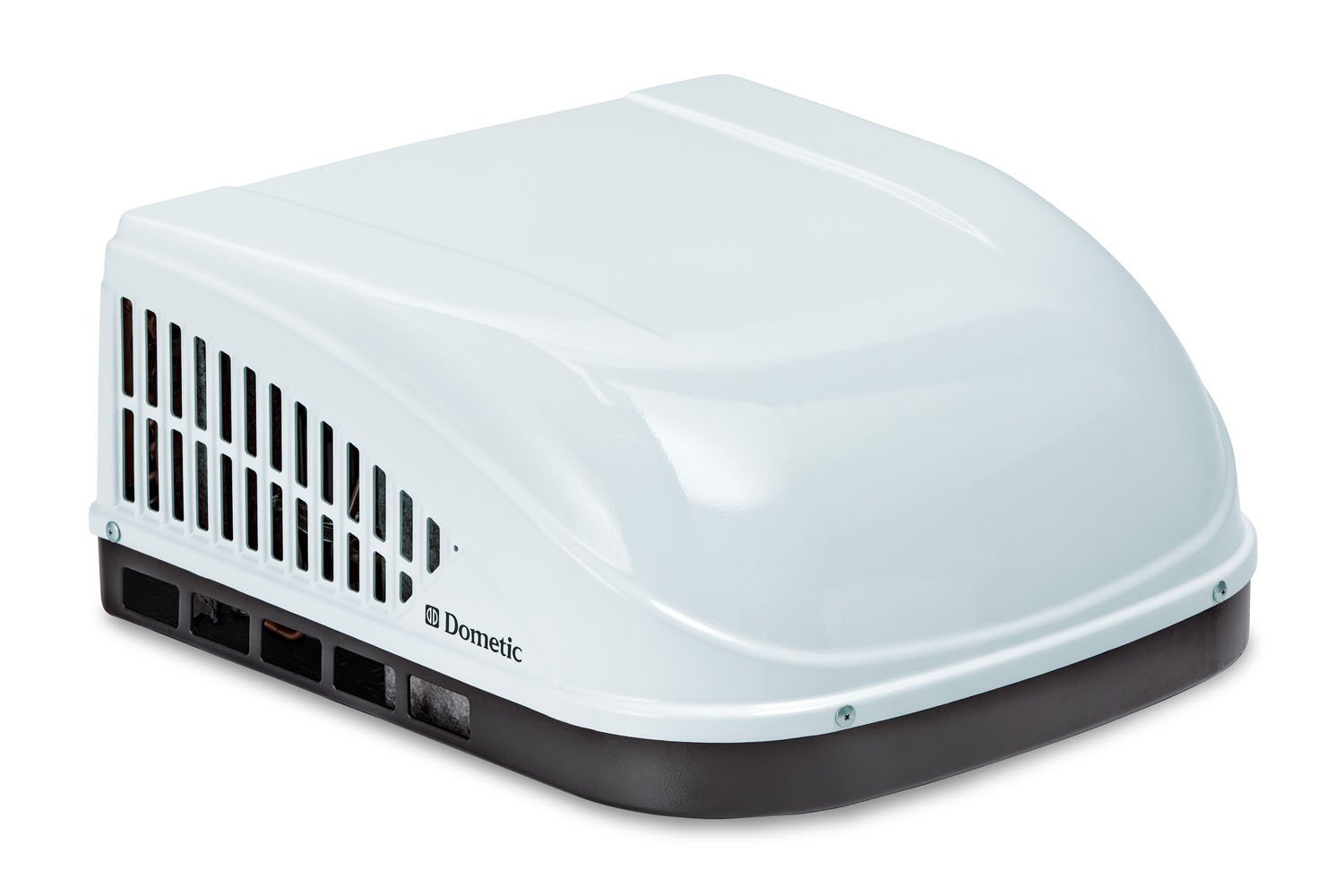
Specification
- BTU Rating: 15,000
- Dimension: 29.2 x 27.2 x 12.7 Inches
- Weight: 74 Pounds
Why This Is The Best
Compatible with ducted and non-ducted vehicle setups, Brisk II is held in high regard by RV air conditioner reviews. Compared to previous models, this camper air conditioner s 19% lighter and offer a 15% increase in airflow which makes it an attractive design on the market. With a BTU rating of 15,000, the Dometic machine should be able to keep the vehicle cool in most the case. As the conditioner is easy to install and maintain, it’s best RV A/C unit for people in need of a robust product.
Utilizing a central discharge air delivery system, Brisk II is considered to be one of the most efficient RV air conditioner models on the market. The high-performance motor and fan ensure that the distribution of air is always optimized. In addition to that, thanks to the use of quality material, the unit body is quite sturdy and very stable. About the noise, the Dometic machine works in a quiet manner so it should not disturb you and your neighbors.
Pros
- Backed with a 2-year warranty
- An efficient and stable air conditioner
- The best RV A/C unit in term of compactness
Cons
- Quite expensive
- The packaging is barely adequate
2. Coleman Mach 15+ – Editor’s Choice
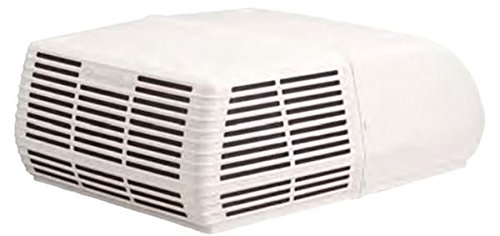
Specification
- BTU Rating: 15,000
- Dimension: 42 x 28 x 16 Inches
- Weight: 90 Pounds
Why It’s A Editor’s Choice
Come with a sizable evaporator, Coleman Mach 15+ is capable of dissipating heat effectively and efficiently in a variety of conditions. Designed with a focus on airflow, the Coleman ducted A/C unit is well known for its high cooling output. In fact, it’s equipped with a 1/3 HP motor which is the strongest motor an RV air conditioner could use. As a result, this air conditioner could deliver cool air at an impressive rate of 320 CFM (Cubic Feet per Minute).
About the body, the streamline shape of the Coleman Mach 15+ allows the unit to keep the airflow rate as well as the cooling efficiency consistent. Since the movements of air are fluid and direct, there is no noise issue while the unit is in use. Therefore, if you looking for the quietest RV air conditioner, you should take a good look at the Coleman machine. In term of durability, with the presence of the all-copper tubing and gas-fluxed brazed joints, the endurance of the air conditioner is respectable.
Pros
- Deliver strong airflow with its powerful motor
- Offer a commendable cooling output for its size
- Straightforward installation and simple operation
Cons
- Some customers receive damaged products
- One of the biggest RV air conditioner models around
3. Dometic Penguin II – Editor’s Choice

Specification
- BTU Rating: 13,500
- Dimension: 29 x 40 x 9.5 Inches
- Weight: 99 Pounds
Why It’s A Editor’s Choice
Also come from Dometic, Penguin II is a sleek low profile A/C unit with an aerodynamic shroud which significantly reduces drag on the move. As a result, the Dometic machine manages to improve the fuel economy of your recreational vehicle and let you save some money for other use. While it possesses a humble dimension compared to other products, this air conditioner is a powerful cooling solution to both non-ducted and ducted setups. The unit motor does produce some noise while in operation so it’s not exactly a quiet air conditioner model.
With the assistance of the high-quality motor fan along with environmentally friendly R410A refrigerant, Penguin II is able to deliver admirable cooling output. The Dometic machine achieves its compact body without compromising its endurance so it could endure challenging environments without fail. As the A/C unit utilizes a high strength ribs-reinforced base pan, its durability and longevity are top-notch. In term of post-purchase support, Dometic back their product with a 2-Year protection plus warranty which is well received by RVer around the globe.
Pros
- Aesthetically pleasing
- Fast delivery and solid packaging
- Maintain the interior temperature consistently
Cons
- A bit noisy when you turn it on
- Air distribution kit and control kit are sold separately
4. Advent ACM-150 Rooftop AC – Best Bang For The Buck
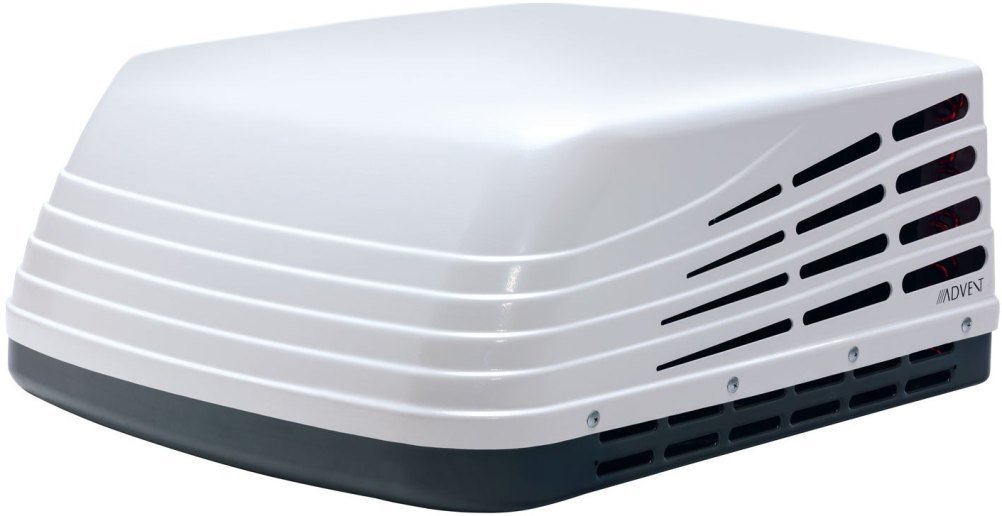
Specification
- BTU Rating: 15,000
- Dimension: 30 x 28 x 14 Inches
- Weight: 50 Pounds
Why We Love it
Engineered and built to withstand the challenges associated with RV travels, ACM-150 is essentially the best RV air conditioner in term of all-around performance. The presence of the watertight gasket with up to 6 dense foam support pads ensures that the unit could function consistently and quietly in many conditions. With a BTU rating of 15,000, the Advent machine should have no trouble keeping the interior temperature at an ideal level. At 68 pounds, this powerful air conditioner is light compared to other products on the market. Couple with the compact body, you could get the unit in place and secure with no need of outside assistance.
About the operation, ACM-150 utilizes a highly effective condensation system which enhances efficiency and gets rid of water run-off. In term of fan speed, there are 3 settings for you to choose depending on the situation: High, Medium and Low. As the unit uses R410a refrigerant which is safe for the ozone layer, it’s friendly to the environment. The metal base pan provides the unit with excellent stability when being subjected to vibration.
In order to install this air conditioner, a 14.25 long x 14.25 wide roof opening is needed.
Pros
- Adjustable fan speed
- Helpful customer service
- Easy to understand instruction
Cons
- A bit loud
- Slightly expensive
>> Read more: How To Pick The Best RV Washer Dryer Combo! <<
5. Atwood Air Command AC-150 – The Best RV Air Conditioner For Non-Ducted Setup
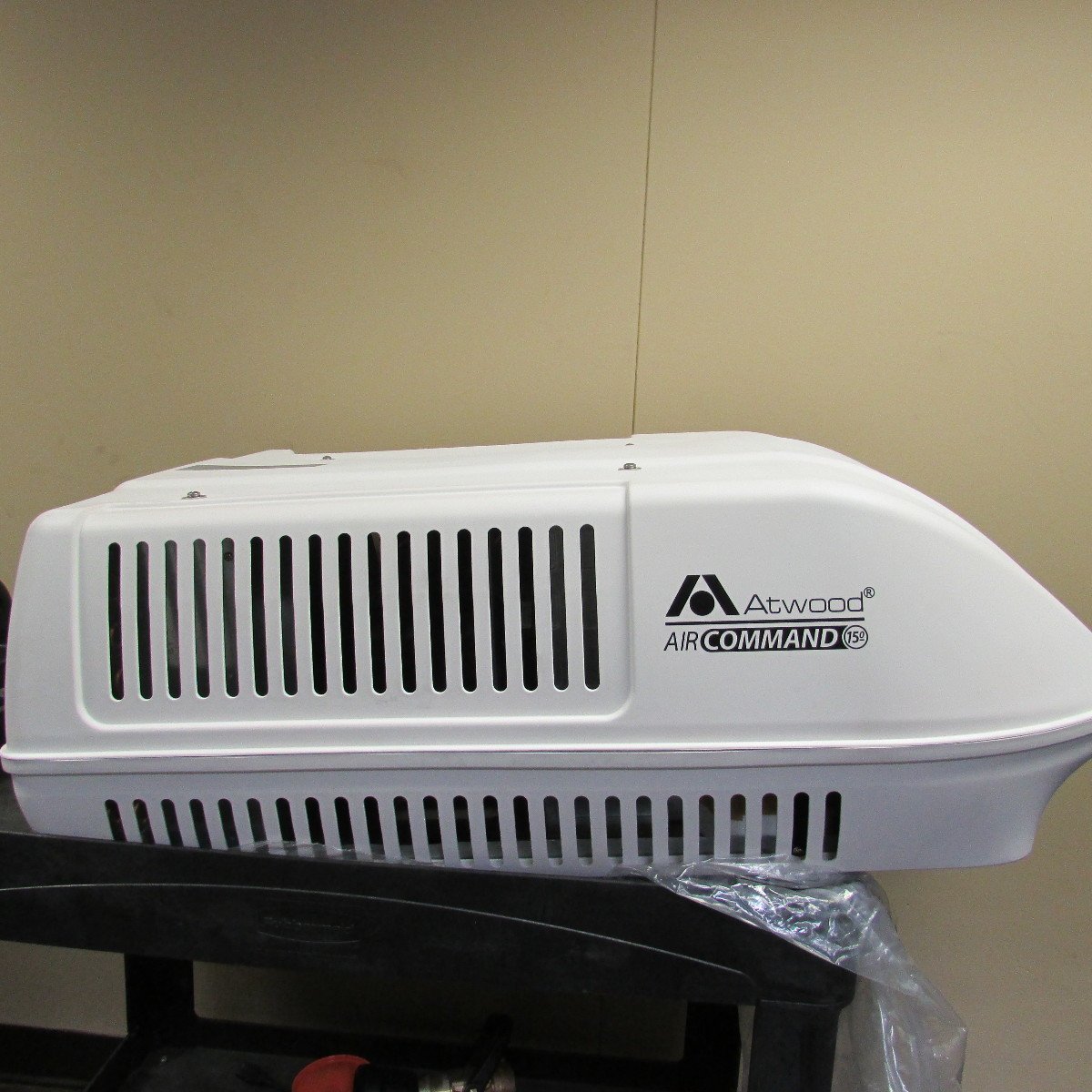
Specification
- BTU Rating: 18,000
- Dimension: 26.5 x 13.6 x 39 Inches
- Weight: 88 Pounds
Why We Love it
Capable of providing cool air at a rate of 330 CFM, Air Command AC-150 is a powerful and efficient air conditioner. Its commendable 18,000 BTU rating ensure that the interior of your recreational vehicle would be kept cool even when the outside temperature reaches an extreme level. Since the Atwood A/C unit is manufactured with strength in mind, it should have a relatively easy time handling harsh elements in the outdoors. Featuring separate motors for the blower fan and the condenser fan, this user-friendly air conditioner could minimize noise disturbances.
One convenient feature of Air Command AC-150 is the heat pump which comes in really handy if you want to use your RV year round. When the temperature is high, the Atwood machine shall proceed to distribute cold airs and ensure that you feel comfortable. In chilly nights, the heat pump of the A/C unit would pull warm air in from the outside in order to heat the interior. The unit comes with the roof seal but if you need the control assembly, you have to order it separately.
Pros
- Well made
- Modern digital control
- Installation is a breeze
Cons
- Some quality issues are reported.
- The shipping is barely acceptable
6. Dometic Sanitation Rivet Semi Tube PKG – The Best RV Air Conditioner In Term Of Hygiene

Specification
- BTU Rating: 13,500
- Dimension: 28 x 24 x 12 Inches
- Weight: 75 Pounds
Why We Love it
If the health is one of your main concerns, Sanitation Rivet Semi Tube PKG from Dometic is the best RV conditioner for your recreational vehicle. Able to handle humidity and moisture built up, this air conditioner is able to maintain a proper level of hygiene. Thanks to the incorporation of advanced technologies and materials, the vibration generated by the Dometic air conditioner is substantially reduced. As a result, its operation is more or less quiet in most of the case.
In term of installation, Sanitation Rivet Semi Tube PKG does not require complex tools, all you need is a 3/8 inch wrench along with a screwdriver. Besides the unit itself, you would be provided with 4 bolts to secure the unit in place when you purchase the Dometic machine. If you want to find a non-ducted air conditioner for RV with a focus on hygiene, this robust model would not let you down. The unit works well on most setups but you should not use it on a 15 amp circuit since it may lead to excessive voltage drops. Too many drops may cause the motor of the A.C unit to become hot and shorten its overall lifetime.
Pros
- Nice BTU rating
- Well written manual
- Come with heat strip
Cons
- The A/C shroud should be strengthened
- You may have to add extra wire length
7. Coleman Mach 3+ – The Best RV Air Conditioner When It Comes To Reliability

Specification
- BTU Rating: 13,500
- Dimension: 90 x 28 x 16 Inches
- Weight: 75 Pounds
Why We Love it
While not as powerful as Mach 15+, Mach 3+ is a solid rooftop RV air conditioner with a BTU rating of 13,500 and an airflow rate of 320 CFM. As a Coleman A/C unit, it also employs an all-copper tubing and gas-flux brazed joints which lead to excellent longevity and durability. To ensure free turning action and avoid potential distortions, the motor of the unit is directly mounted to the bulkhead. Because of the plastic drain pan, you don’t have to experience corrosion issues while using this robust air conditioner.
Possessing condenser coils with raised lance fins, Mach 3+ is capable of dissipating heat very efficiently.
In the case you wish to equip the unit with some heating capability, you could consider purchasing the optional heater assembly. That heater assembly would outfit the Coleman machine with a heating function rated at 5,600 BTU. As a result, you could use this versatile air conditioner throughout the year without fail. About the air condition shortcoming, the copper line that runs between the condenser and the pump is a bit fragile. In a lot of case, the copper line may break when being subjected to vibration.
Pros
- Reasonable price
- Strong motor
- Simple and robust
Cons
- Weak copper line
- Could get quite loud
8. Dometic Penguin HP – The Best RV Air Conditioner For Year Round Travels

Specification
- BTU Rating: 15,000
- Dimension: 40 x 28 x 11 Inches
- Weight: 109 Pounds
Why We Love It
Heavy and powerful, Penguin HP is the air conditioner for RVer that have a large vehicle and want more BTU.
At a weight of more than 100 pounds, it could get slightly difficult to install the Dometic machine with one person. Nonetheless, because the fixtures for installation are already provided, it’s comparatively simple to firmly secure this formidable air conditioner. This RV rooftop air conditioner should have no trouble fitting standard 14 long x 14 wide vent openings and is compatible with ducted/airbox setups.
Equipped with an aerodynamic shroud, Penguin HP is less susceptible to wind resistance which is quite useful if you plan to travel through windy regions. Because of the internal heat pump, the A/C unit could serve as a heater when the temperature drops low. Thanks to the efficient heating function, you could comfortably travel on your recreational vehicle throughout the year with this versatile Dometic unit by your side. Possessing high-performance adjustable motor fan, it’s possible for you to carefully regulate the flow of cool, or hot, air as you see fit.
Pros
- Could also serve as a heater
- Utilize eco-friendly refrigerant
- Stable rib-reinforced base pan
Cons
- The controls are sold separately
- Come without an instruction manual
A Detailed Guide To How To Get Best RV Air Conditioner
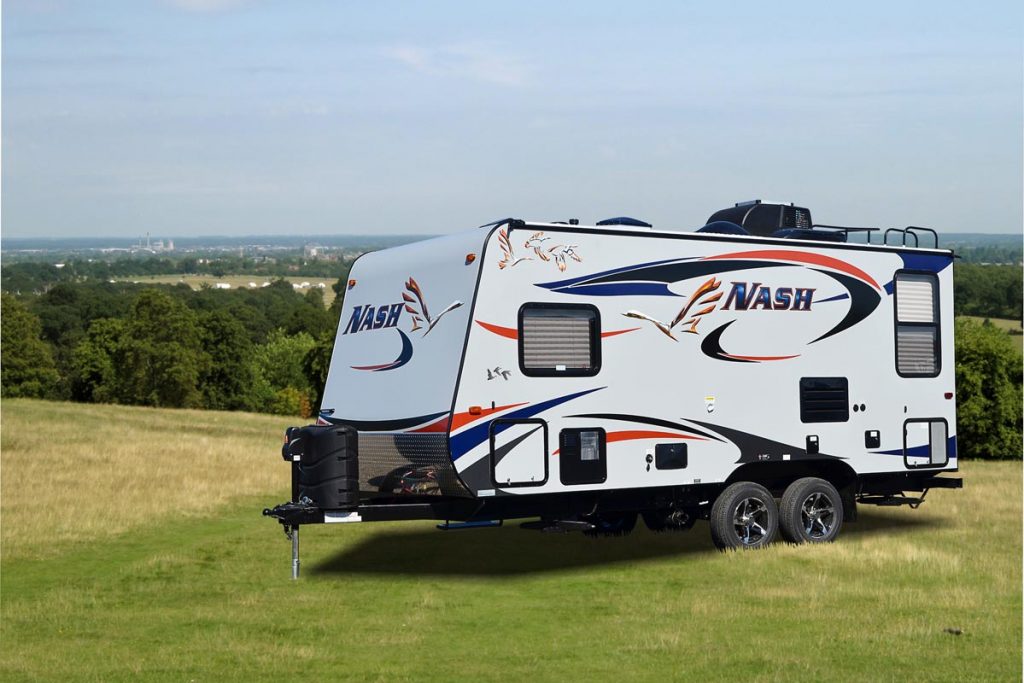
Exam And Assess The Unit BTU (British Thermal Unit) Rating
In the usual case, the strength of air conditioners is shown through their BTU rating. For most of the time, the BTU rating of conventional models is around 13,500 or so. Technically speaking, an air conditioner with a BTU rating of 13,500 is sufficient to keep you comfortable in the summer heat. Nonetheless, if extreme temperatures/ humidities are expected, you should get a model with a BTU rating higher than the standard 13,500. For large size recreational vehicles, using more than one unit to keep every corner of the interior cool is not a bad idea as well. Do remember that best RV air conditioner is not always the one with the highest BTU rating.
Consider The Dimension Of Your RV And The A/C
Having the best RV air conditioner is meaningless if your RV could not accommodate it. Whenever it’s possible, you are advised to go after compact, low profile RV air conditioners instead of big ones. While big A/C units do often have excellent power ratings, they are comparative cumbersome and hard to install/remove. In addition to that, using an air conditioner with a bulky profile may limit the maneuverability of your recreational vehicle. As some manufacturers don’t pay enough attention to the aerodynamic aspect of their products, installing a sizable air conditioner could hurt the fuel economy. As a result, you should prioritize small RV A/C units whenever it’s possible.

The Best RV Air Conditioner For You Must Work Quietly
Given that RV travel is all about comfort, the air conditioner noise is an issue that you must not underestimate. You could never enjoy the cool air from the A/C unit if you are constantly bothered by the noise. If you intend to visit RV campgrounds, a loud air conditioner would surely earn you the ire of other people. As a result, before you buy an air conditioner, make sure that it’s not too noisy while being used. Nowadays, many brands have incorporated advanced noise reduction technology into their products so it’s should not be too hard to find a quiet model.
Installation Process And Maintenance Procedures
While you could always hire someone to do everything for you, you should select a model that you could install and maintain on your own. You already spent a good amount of money to get the air conditioner, therefore, try to cut down unnecessary expenses. Before you head to the counter, find out whether you could install the A/C without professional assistance or not. The best RV air conditioner for your vehicle must let you perform regular checkups and minor repairs without involving complex preparations. In any case, you should prioritize products that offer spare parts and long-term warranty. With them, you don’t have to worry about costly repairs in the foreseeable future.
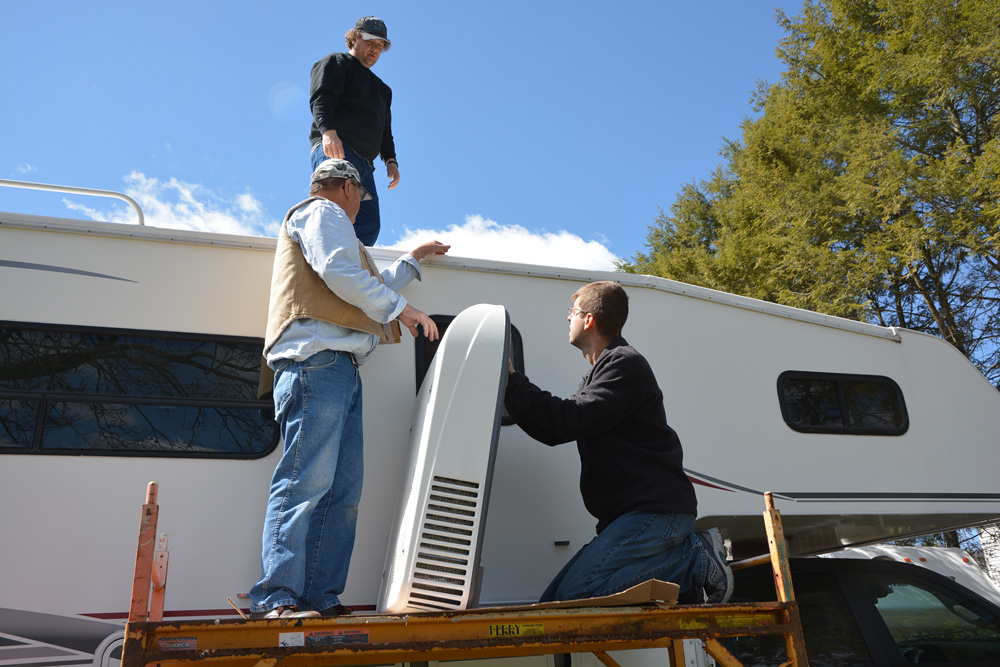
Think About The Power Consumption
Air conditioners are considered by many experienced RVers to be one of the most power-hungry appliances you can use. The more powerful an air conditioner is, the more power it requires to function properly. If you don’t take the power consumption of the A/C unit into account, you may have a headache when the utility bill arrives. As time goes by, the operating expense of air conditioners could strangle your wallet if you don’t plan ahead. To avoid falling in such a predicament, make sure that you know the consummation rate of your A/C unit. The best RV air conditioner for your vehicle needs to come with a power consumption rate that you could accept.
Is It Worth Buying A Heat Pump Equipped Air Conditioner?
In the case most of your travels take place in the summer, conventional A/C models are usually quite adequate.
If you wish to use your RV year round, it’s recommended that you get a model with heat pump. While air conditioners with heat pump are comparatively more expensive than non-heat pump ones, they would come in handy in a low-temperature setting. By using heat pump-equipped air conditioners, you could stay cool during the summer and receive sufficient warmth in winter.
How Many Types Of Air Conditioner Are Currently In Circulation?
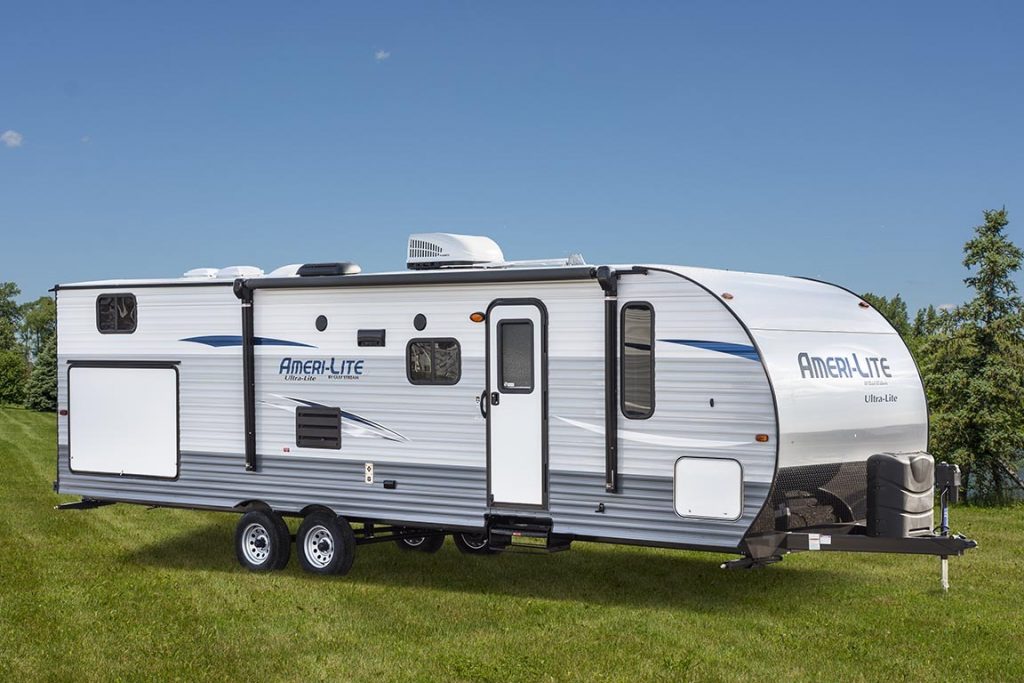
There are 2 common types of air conditioner you could run into: Ducted and Non-Ducted. Ducted air conditioners are bolted to the top of the recreational vehicle and send cool airs through the vehicle ducts. As a result, ducted A/C units are able to keep every section of the vehicle at the same temperature. On the other hand, non-ducted air conditioners spread cool airs using separate air handlers which let you adjust the temperature in a particular room. Therefore, it’s relatively easy for RV owners to carefully optimize the cooling of their vehicles when they have non-ducted A/C units around.
Ducted Unit Vs Non-Ducted Unit, Which One Is Better?
Generally, there is no such thing as the perfect type of air conditioner, each has its own pros and cons. For people that want to have multiple cooling zones at their disposal, non-ducted A/C units are excellent choices. On the other hand, for RVers that simply want to maintain a uniform temperature throughout the vehicle interior, ducted A/C units should work great. In order to select a suitable type of air conditioner, all you have to do here is to take your needs and requirements into account. By comparing your desires to the characteristics of each type, you could decide which one is more suitable and secure the best RV air conditioner.
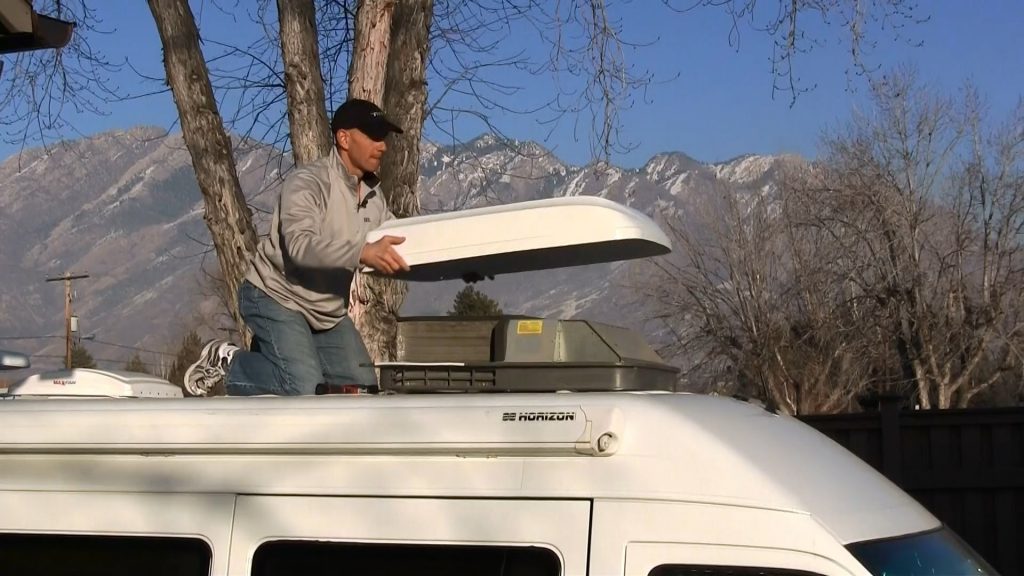
Related Buyer’s Guide and Reviews:
| Best RV Short Queen Mattress | >> Full Review |
| Best RV Wax For Fiberglass | >> Full Review |
| Best TPMS for RV | >> Full Review |
Last Updated on January 1, 2024
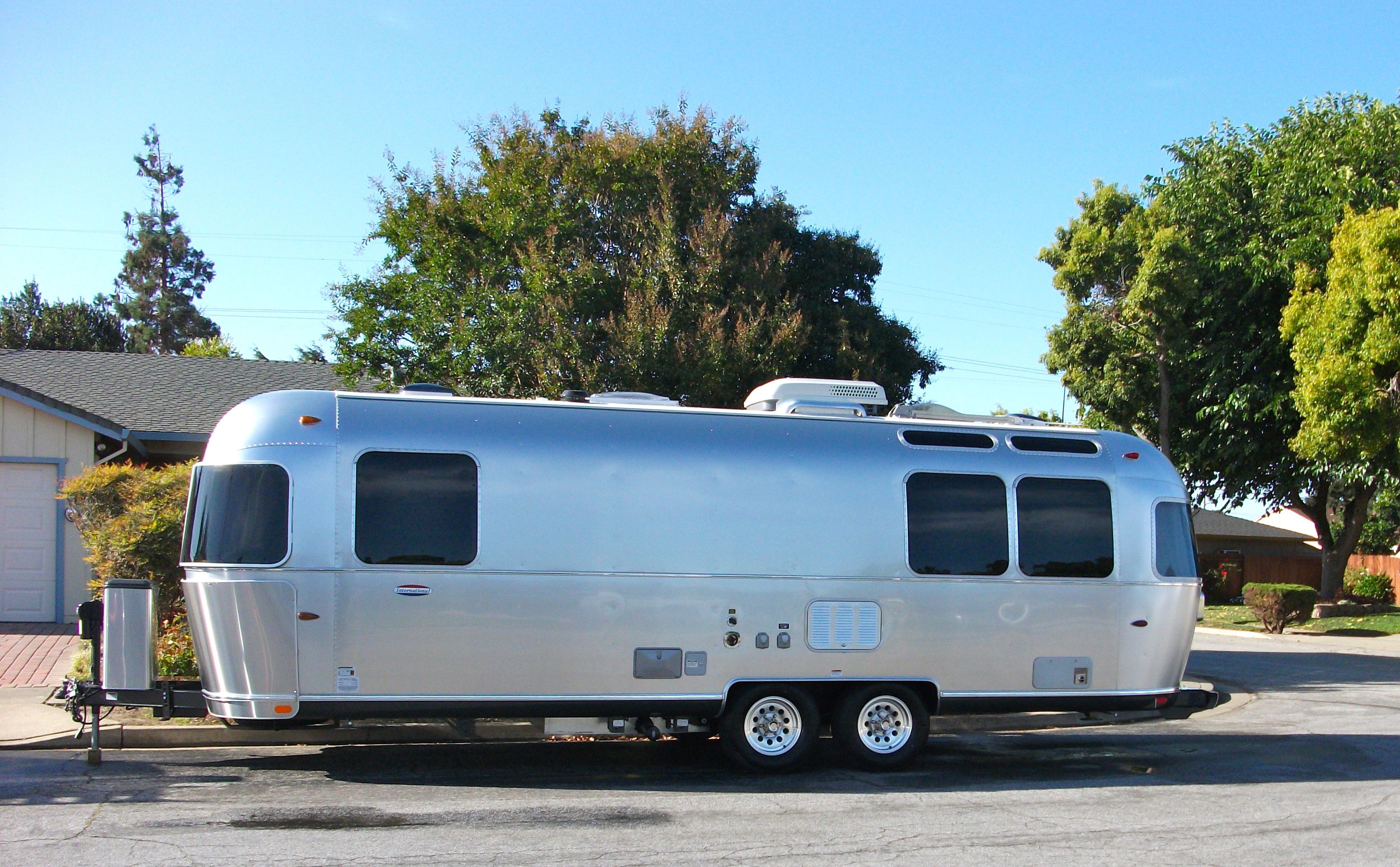

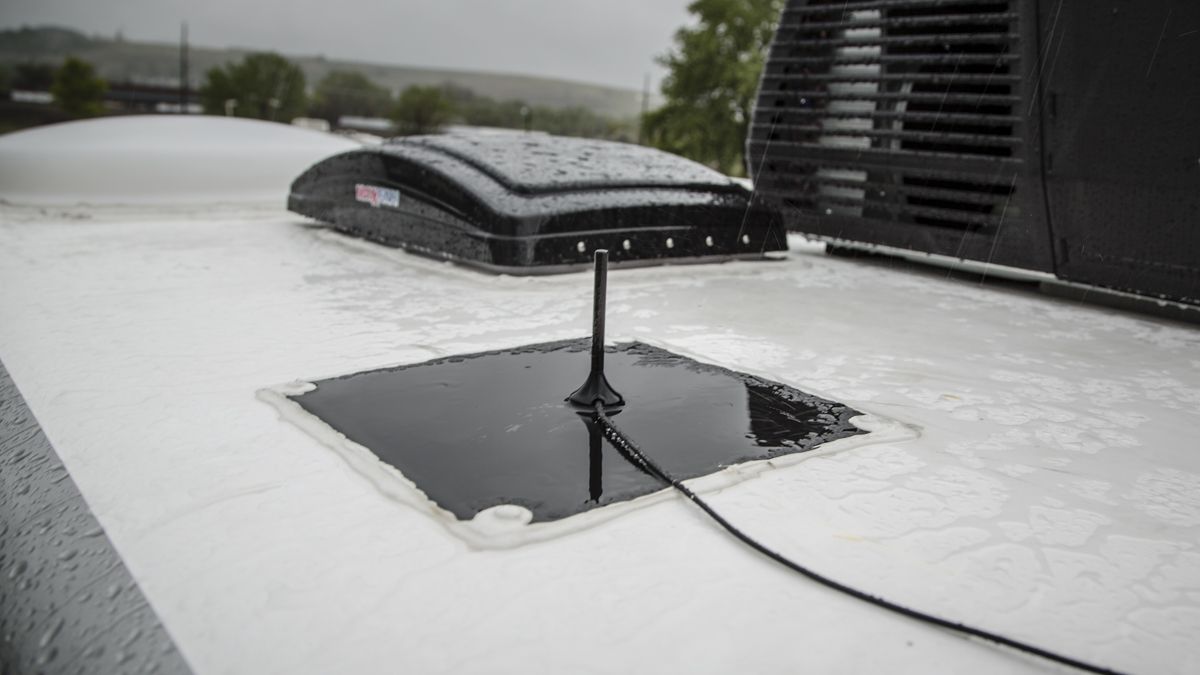




Hello this was great post